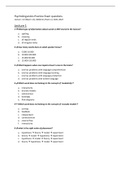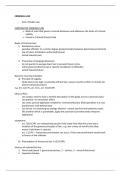Overig
Psycholinguistics Practice Exam Questions Week 1-4 (Lecture 1-6)
- Vak
- Instelling
In this document you will find 55 practice exam questions that will prepare you for the midterm of psycholinguistics. It is based on what is said in the lectures and the lecture slides. It covers language production as well as statistics. There are multple choice questions and open questions. The a...
[Meer zien]




